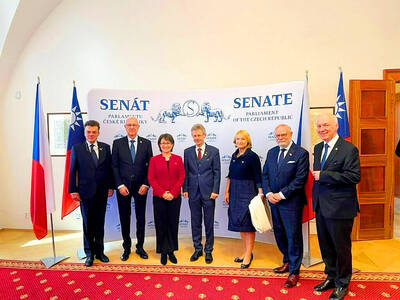Japan and the US will declare in a joint agreement tomorrow that security in the Taiwan Strait is a "common strategic objective," The Washington Post said yesterday, citing a draft of the document it obtained.
The agreement will be announced after the US Secretaries of State, Condoleezza Rice, and of Defense, Donald Rumsfeld, meet their Japanese counterparts in Washington today, the daily said in its article datelined in Tokyo.
"This is the first time that Japan has made its stance clear; in the past, Japan has been very indirect on the Taiwan issue," said Koh Se-kai, Taiwan's special representative to Japan. "We're relieved that Japan has become more assertive."
There was no immediate reaction from China.
The agreement to be announced tomorrow declaring security in the Taiwan Strait as a "common strategic objective" of Washington and Tokyo is the most significant alteration since 1996 of the US-Japanese Security Alliance, the daily said.
"It would be wrong for us to send a signal to China that the United States and Japan will watch and tolerate China's military invasion of Taiwan," said Shinzo Abe, the acting secretary general of Japan's ruling Liberal Democratic Party, who is widely considered a likely successor to Prime Minister Junichiro Koizumi.
"If the situation surrounding Japan threatens our security, Japan can provide US forces with support," he added.
"We consider China a friendly country, but it is also unpredictable," an unidentified senior Japanese government official was quoted as saying in The Washington Post.
"If it takes aggressive action, Japan cannot just stand by and watch," he added.
The Ministry of National Defense (MND) yesterday welcomed the expected agreement.
"Although the MND hasn't received any information about such an agreement from the US or Japan, the MND welcomes any force which could stabilize the Taiwan Strait, " ministry spokesman Rear Admiral Liou Chih-chien (
Liou said that if the US and Japan really see security in the Taiwan Strait as a "common strategic objective," it would enhance Taiwan's determination to defend and deter a military attack from China.
Today's US-Japan talks are a necessary prelude to decisions on how to realign the nearly 50,000 US forces in Japan, part of a global transformation of the US military to cope with new threats such as terrorism.
Japan is leaning toward a bigger role as a strategic hub from which US forces can respond to threats in an "arc of instability" from the Middle East to the Koreas, a shift seen by many experts as an expansion of the alliance.
Both Washington and Tokyo are clearly eyeing Beijing's military buildup askance.
"Beijing's military modernization and military buildup is tilting the balance of power in the Taiwan Strait," CIA Director Porter Goss told a Senate panel on Wednesday. "Chinese capabilities threaten US forces in the region."
China quickly denounced the CIA assessment, saying the remarks sent the wrong signal to Taiwan.
Japan has also become increasingly outspoken in expressing its concerns about China's military modernization.
additional reporting by Rich Chang

FREEDOM OF NAVIGATION: The UK would continue to reinforce ties with Taiwan ‘in a wide range of areas’ as a part of a ‘strong unofficial relationship,’ a paper said The UK plans to conduct more freedom of navigation operations in the Taiwan Strait and the South China Sea, British Secretary of State for Foreign, Commonwealth and Development Affairs David Lammy told the British House of Commons on Tuesday. British Member of Parliament Desmond Swayne said that the Royal Navy’s HMS Spey had passed through the Taiwan Strait “in pursuit of vital international freedom of navigation in the South China Sea.” Swayne asked Lammy whether he agreed that it was “proper and lawful” to do so, and if the UK would continue to carry out similar operations. Lammy replied “yes” to both questions. The

Two US House of Representatives committees yesterday condemned China’s attempt to orchestrate a crash involving Vice President Hsiao Bi-khim’s (蕭美琴) car when she visited the Czech Republic last year as vice president-elect. Czech local media in March last year reported that a Chinese diplomat had run a red light while following Hsiao’s car from the airport, and Czech intelligence last week told local media that Chinese diplomats and agents had also planned to stage a demonstrative car collision. Hsiao on Saturday shared a Reuters news report on the incident through her account on social media platform X and wrote: “I

SHIFT PRIORITIES: The US should first help Taiwan respond to actions China is already taking, instead of focusing too heavily on deterring a large-scale invasion, an expert said US Air Force leaders on Thursday voiced concerns about the Chinese People’s Liberation Army’s (PLA) missile capabilities and its development of a “kill web,” and said that the US Department of Defense’s budget request for next year prioritizes bolstering defenses in the Indo-Pacific region due to the increasing threat posed by China. US experts said that a full-scale Chinese invasion of Taiwan is risky and unlikely, with Beijing more likely to pursue coercive tactics such as political warfare or blockades to achieve its goals. Senior air force and US Space Force leaders, including US Secretary of the Air Force Troy Meink and

Czech officials have confirmed that Chinese agents surveilled Vice President Hsiao Bi-khim (蕭美琴) during her visit to Prague in March 2024 and planned a collision with her car as part of an “unprecedented” provocation by Beijing in Europe. Czech Military Intelligence learned that their Chinese counterparts attempted to create conditions to carry out a demonstrative incident involving Hsiao, which “did not go beyond the preparation stage,” agency director Petr Bartovsky told Czech Radio in a report yesterday. In addition, a Chinese diplomat ran a red light to maintain surveillance of the Taiwanese